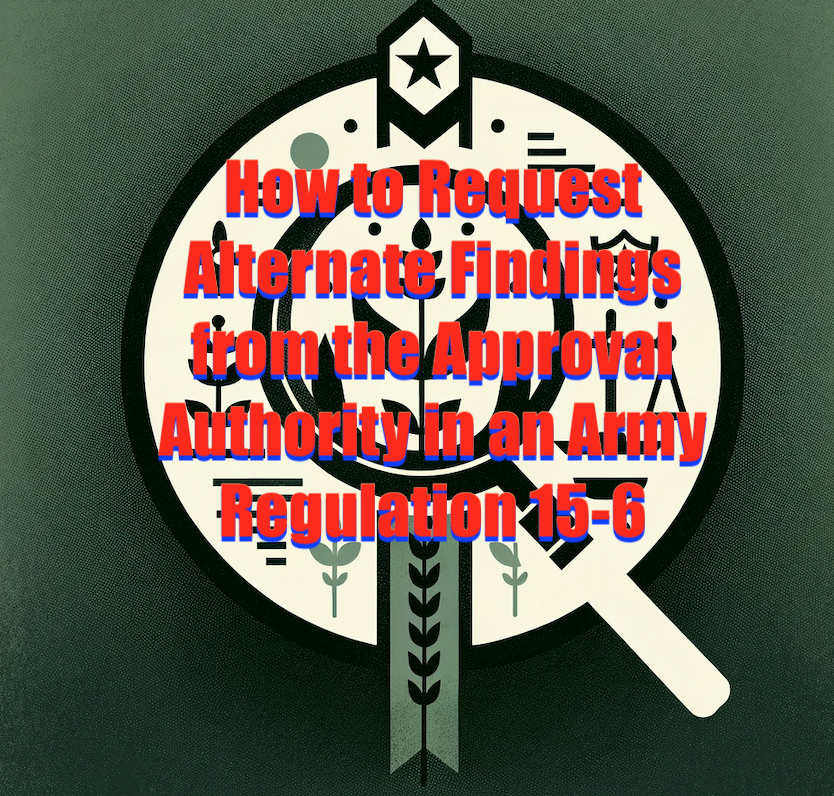In the military, undergoing a command investigation can be a highly stressful process, especially when it leads to findings that you believe are unjust or incorrect.
Under Army Regulation 15-6, service members have the right to challenge these findings, whether it pertains to sexual harassment investigations, equal opportunity investigations, or inspector general investigations, too few try to undermine the findings before they lead to adverse actions. One option that few try is to request alternate findings from the approval authority. This blog post outlines a step-by-step approach to making such a request, emphasizing the critical aspects that service members need to consider.
Understand Your Grounds for Request
Firstly, identify the specific derogatory findings you wish to challenge. It’s essential to be clear about why you believe these findings are incorrect, whether due to procedural errors, a lack of evidence, or other reasons. Requesting the approval authority to either disapprove the findings or misconduct investigation is your initial step.
Highlight Procedural Violations
Point out any procedural violations that may have occurred during the investigation. For example, if actions were taken without the necessary approvals or if you were not given the opportunity to participate fully in the investigation, these could be grounds for challenging the findings. Too often investigating officers make findings without ever asking a respondent if they did or did not commit a specific act.
Emphasize Lack of Investigation
If key events were not investigated or if you were not asked specific, relevant questions, highlight these oversights. The absence of a thorough investigation into the allegations against you strengthens your request for alternate findings. This is particularly the case when you are aware that there is evidence to support contrary conclusions.
Present Supporting Evidence
Gather and present evidence that refutes the derogatory findings. This could include affidavits from witnesses, your own sworn statement, or any other documentation that challenges the accuracy of the investigation’s conclusions.
Question the Accuser’s Credibility
If the investigation’s findings heavily rely on the accuser’s statements, which other findings have refuted, question the accuser’s credibility. An inconsistency in the accuser’s reliability can be a significant factor in requesting alternate findings. This is true especially in light of the credibility assessment that investigating officers are required to make in the face of contradictory evidence. Too often they fail to confront opposing evidence.
Cite the Requirement for Credibility Assessments
AR 15-6 mandates credibility assessments when conflicting evidence exists. If such assessments were not adequately conducted, or if alternative findings were not considered, this should be explicitly mentioned in your request.
Understand the Approval Authority’s Discretion
The approval authority has the discretion to approve, disapprove, modify, or add to the findings and recommendations, consistent with the evidence. Highlight this discretion and request that they exercise it in favor of disapproving the derogatory findings. Few respondents ever ask, so it is important to empower the approval authority to know they have this discretion.
Request a Reopening of the Investigation
To be as persuasive as possible, if you believe the approval authority is disinclined to approve alternate findings, you should consider proposing that the investigation is reopened. If you believe further fact-finding is necessary, you can request that the approval authority directs the investigating officer to reopen the investigation. This request should be backed by a rationale and evidence that supports the need for additional investigation.
Implore Disapproval Based on Due Process
Argue that due process has been overlooked and that the layers of appeal rights and administrative actions awaiting you should be considered. Request that any adverse actions be held in abeyance until your memorandum request is fully considered and the required processes are completed.
Supply Adequate Evidence
Ensure you provide sufficient evidence to support your request for disapproving the findings. This includes detailing the evidence you have supplied and explaining why it undermines the derogatory findings. Connect the dots for the approval authority. Be explicit. Approval authorities are not going to study the minutiae from your investigation, so you need to do it for them.
Conclusion and Call to Action
Challenging findings from a command investigation is a right afforded to service members under Army Regulation 15-6. Understanding how to navigate this process effectively is crucial for ensuring that justice is served and that your position will be fairly considered.
For those facing the challenge of disputing findings from a command investigation, seeking the advice and representation of private civilian counsel can be invaluable. A legal professional with expertise in military law can provide the guidance needed to navigate this complex process and ensure that your rights are fully protected. Process matters.
If you’re in this situation, don’t hesitate to reach out to our firm for support. We are committed to helping service members achieve the best possible outcomes in their cases. Schedule a consultation today to learn more about how we can assist you in requesting alternate findings from the approval authority in an Army Regulation 15-6 investigation. Timelines are tight, so do not delay.



